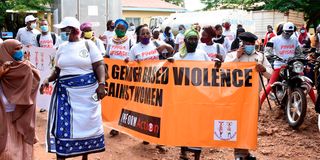AU intensifies positive masculinity campaign in GBV fight

Civil society activists mark 16 days of Activism against Gender-based Violence in Isiolo town on December 8, 2020. The AU is now betting on positive masculinity to help end violence against women and girls.
What you need to know:
- The AU held its second Men’s Conference on Positive Masculinity Initiative in Dakar, Senegal, on Thursday.
- The theme was ‘Advancing actions and promoting positive masculinity to end violence against women and girls’.
The African Union (AU) is spearheading a campaign to enhance positive masculinity in the fight against violence against women and girls.
The AU held its second Men’s Conference on Positive Masculinity Initiative in Dakar, Senegal, on Thursday. The theme was ‘Advancing actions and promoting positive masculinity to end violence against women and girls’.
The initiative focuses on involving men in influential leadership positions to bring on board other men and boys in efforts to eliminate gender-based violence (GBV), a critical means to ending structural and institutional inequalities.
The AU, in a press statement issued after the conference, noted that most cases of violence against women and girls are perpetrated by men, hence the need for specific interventions targeting them.
“While most men may never condone the use of violence, the fact is that men are overwhelmingly the perpetrators. This status quo is often heightened in times of socio-economic crises, such as that experienced during the Covid-19 pandemic, which had a dramatic increase in gender-based violence that was referred to as the shadow pandemic,” the statement read.
The initiative is led by the Women, Gender and Youth directorate and the Office of the Special Envoy of Women, Peace and Security, in collaboration with the African Women’s Leaders Network. It is hinged on engaging men and boys to support the broader movement for Gender Equality and Women’s Empowerment.
Positive masculinity is crucial to eliminating all forms of violence and discrimination against women and girls. It promotes healthy, peaceful and social well-being for all. In Africa, the prevalent forms of GBV include intimate partner violence, female genital mutilation (FGM), child marriage, and sexual violence in conflict such as rape, sexual assault and forced prostitution.
DRC Congo President Felix Tshisekedi was in February appointed the first AU Champion on Positive Masculinity during the 35th Summit and Assembly of the Heads of State and Government of the African Union in Addis Ababa, Ethiopia.
The AU has, in recent years, been relentless in addressing the scourge of violence against women and girls on the continent. It has developed and adopted strategies and legal instruments that focus on the attainment of gender equality and women's empowerment in all spheres of life. These include policies and programmes on women’s and girls’ rights, thus advocating their protection and prohibiting violence, harmful practices and other social norms.
The legal frameworks have enabled member states and non-state actors to adopt additional laws and strategies at the national and regional levels to address existing and emerging challenges on gender equality and women’s empowerment.
Legal frameworks
Some of the legal frameworks by the AU include the Protocol to the African Charter on Human and Peoples’ Rights on the Rights of Women in Africa (Maputo Protocol), the Solemn Declaration on Gender Equality in Africa (SDGEA), the AU Strategy for Gender Equality & Women’s Empowerment and the African Charter on the Rights and Welfare of the Child.
It also has the Saleema Initiative, a plan to galvanise political action to accelerate the elimination of FGM. Already, about 150 million girls and women in Africa have undergone the cut. The Saleema Initiative was launched in 2019 and Burkina Faso’s President designated as the AU Champion on Eliminating FGM. Some 50 million girls at risk of the cut by 2030.
There is also the Spotlight Initiative through which the AU and its partners seek to end child marriage. According to the United Nations Children's Fund (Unicef), about 130 million girls in Africa have been married in their childhood. In sub-Saharan Africa, a staggering 40 per cent of girls marry before their 18th birthday, and African countries account for 15 of the 20 countries with the highest rates of child marriage.
In 2021, the African heads of state and governments also adopted the Kinshasa Declaration, expressing their concern about the persistence of violence against women and girls in Africa. They made far-reaching recommendations and a call to action to prevent and eradicate all forms of discrimination against women and girls. The Declaration calls for positive masculinity in leadership
The conference saw the leaders commit to facilitating, negotiating and adopting, within one year, the African Union Convention on Ending Violence Against Women and Girls as envisaged in the Kinshasa Declaration, which came into force in 2021.
Globally, campaigns such as HeForShe and other local initiatives across Africa have explored innovative solutions to engage men and boys from all walks of life as allies in gender equality, and in the elimination of all forms of GBV.
The leaders also committed to Introducing gender-transformative intervention such as Domestic Violence Prevention Training Programmes for boys and men at the community level using local governance structures and institutions. They will also galvanise their participation in the Continental Men’s Coalition to end violence against girls as a strategy for the promotion of positive masculinity and a new equitable gender norm in Africa.
They will further increase investment in gender transformative social protection programmes and public social services in the rural areas. These drivers include unpaid care domestic work, negative attitude towards sexual and reproductive health and reproductive rights, stereotypes and other forms of discrimination.
The continuous engagement with traditional and religious leaders, including their strategic participation and interaction with heads of state and AU champions on campaigns and programmes on elimination of harmful practices and violence against girls and women is also part of the commitment.





